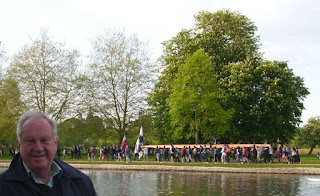Decimalisation and the changes that have taken place in
weights and measures have shafted English writers. It’s just too difficult to
make the necessary conversions. For example, it is quite unacceptable to modernise
“the murderer inched towards his victim, his heart pounding” to “the murderer centimetred
towards his victim, his heart kilogramming”. And how can you express the old adage
“inch by inch it’s a cinch, by the yard it’s very hard”? Here’s my best attempt
“millimetre by millimetre it’s much simpler, by the metre it defeats you”.
Hardly trips of the tongue, does it?
 Reversing the situation, it is almost impossible for the
youngsters of today to understand the words of some dated novels, poems or
songs. My prime example is one of the songs I sing down on the huerto when creating
yet another plaster arch between the beams. There are sixteen new beams, which
makes eighteen spaces to fill. Each space takes about a day to complete and I
start by installing six formers then laying twelve or so lathes on top of them.
I then spend an age cutting short lengths of bamboo to fill the inevitable gaps
where the lathes meet the wobbly beams (they are actually trees with the bark
and branches removed). I finish the preparation by placing four leaves on the
lathes (to leave their imprint) and by making and installing three wire-ties
which will become embedded in the plaster.
Reversing the situation, it is almost impossible for the
youngsters of today to understand the words of some dated novels, poems or
songs. My prime example is one of the songs I sing down on the huerto when creating
yet another plaster arch between the beams. There are sixteen new beams, which
makes eighteen spaces to fill. Each space takes about a day to complete and I
start by installing six formers then laying twelve or so lathes on top of them.
I then spend an age cutting short lengths of bamboo to fill the inevitable gaps
where the lathes meet the wobbly beams (they are actually trees with the bark
and branches removed). I finish the preparation by placing four leaves on the
lathes (to leave their imprint) and by making and installing three wire-ties
which will become embedded in the plaster.
Have you followed all that or just lost interest? Anyway, I
am then ready to pour plaster between the beams: it usually takes ten mixes of the
stuff. All of this means that I climb up and down to my wobbly scaffolding at
least twenty-five times each day. In short, it’s all a bit boring which is why I
sing. My prime example of dated English is Mary
of the Mountain Glen. Here’s the first verse in case you’ve forgotten it.
Mary of the mountain
glen
Seduced herself with a
fountain pen
The pen it bust, the
ink went wild
And she gave birth to
a blue-black child
They called the
bastard Stephen
They called the
bastard Stephen
They called the
bastard Stephen
Because that was name
of the ink
Not Quink
Singing this to any of my grandchildren would produce an
increasingly blank face. They might, just possibly, know what a glen is. After
that it will be downhill all the way from the fountain pen to Quink. So, whilst
placing all that plaster (nearly one hundred bags) my mind has not been idle.
Here is my creation: a modern verse for the song:
Mary grew very fond of
her son
She thought she would
have another one
One day when she was
all alone
She seduced herself
with a mobile phone
The phone it rang,
Mary went wild
And she gave birth to
a cellular child
They called the little
one Samsung
They called the little
one Samsung
They called the little
one Samsung
Because that was the
name of his Dad
Step Dad.
So what’s next? Assuming a little health problem is dealt
with, I shall be back to work on Monday and will finish the plastering later in
the week. Then I will spend a day or two laying a concrete slab on top of the
plastered beams followed by replacement of the original roof tiles. Tradition
claims that these old clay tiles have been shaped on a virgin’s thigh, which is
perhaps why they are so rare nowadays post the invention of the fountain pen
and mobile phone.































